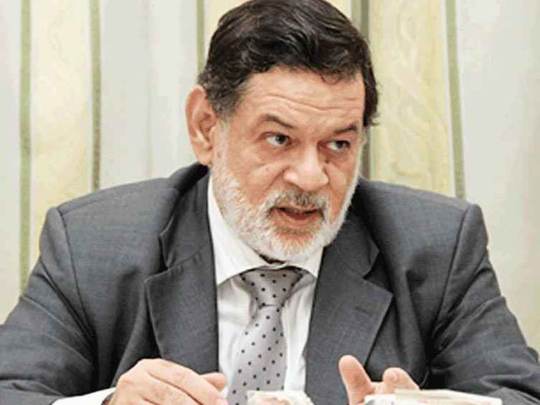
Cairo: Tharwat Al Kherbawi, who was a member of the Muslim Brotherhood until he resigned in 2002, is now among the most vocal critics of the group.
In an exclusive interview with Gulf News he predicts that the Brotherhood will not withstand three days of mass demonstrations. As an informed observer, Al Kherbawi revealed that President Mohammad Mursi wanted to take refuge at a military camp, but the army refused. So the Brotherhood arranged hiding him in a secret location during the expected protests on June 30.
The group’s Supreme Guide Mohammad Badie and his deputy Khairat Al Shater have sent members of their families abroad. Al Kherbawi also told Gulf News that an idea of sacrificing Mursi to save the organisation from a dark fate has been discussed within its Guidance Bureau.
- Do you expect that the brotherhood will withstand June 30 rallies?
The Muslim Brotherhood regime will fall within three days of mass demonstrations. They can’t withstand millions of angered people calling for change. On the contrary of their claims, the Tanzim (Brotherhood’s organisation) is very weak. They will not resist too much because saving the organisation is the first priority according to their doctrine. It comes before all others like seizing the power.
If they face an increasing wave of protests they will shrink their presence. The Guidance Bureau will issue instructions to the grassroots to withdraw immediately and escape in burrows just as they were doing under the former regime. As an evidence of their fear, the Supreme Guide Mohammad Badie has sent most of his family’s members abroad. So did his deputy Khairat Al Shater.
- Anti-Mursi Protesters will march to the presidential palace on June 30. Are the Brotherhood’s supporters preparing to confront with anti-Mursi protesters, as it happened last December?
The Republican Guard will protect the presidential palace and Mursi will leave his residence before June 30. He will hide in a secret place. According to my own sources, Mursi wanted to take refuge at a military camp, but the army refused. What has been arranged within the group ranks is hiding him in a secret location.
The Egyptian people are greater and stronger than the Muslim Brotherhood. Two hundred thousand citizens would likely sit-in outside the presidential palace. They would set a large number of tents to stay there.
As I expect, June 30 protests would be like 28 January 2011. The Mursi’s regime will collapse and nobody would intervene violently to disperse the demonstrators. US administration would abandon the Brotherhood if mass protests continued for three days.
- As an observer, is it possible that the brotherhood uses violence to quell the protests?
The Muslim Brotherhood members now don’t exceed 300,000. So they usually are seeking help from Salafists and Jihadists in staging great gatherings to show that they have the power of the street. In the case of June 30 protests they wouldn’t be able to use violence on the streets. They are more worried about their headquarters because security troops refused to protect them. Many of their members will be assigned to guard their HQs. So, all they could do is to tuck some young members of the Brotherhood between demonstrators to throw Molotov cocktails on the presidential palace and trigger clashes.
- On Sunday the Guidance Bureau held an urgent meeting after Defence Minister Abdul Fatah Al Sisi called for a genuine reconciliation between political parties within a week. What are the options discussed inside the group?
There is an internal controversy within the Brotherhood. Many members complain that the president’s decisions have directed people’s hatred to the movement itself. But the leaders are trying to convince young members that June 30 demonstrators are against Islam, not against the president.
Some people within the group suggested recently sacrificing President Mursi and calling for a referendum on his survival as a president or hold early presidential elections. Now they ought to choose between saving the organisation or retain the power. The leadership may decide to sacrifice president Mursi if they felt that his continuity would harm the organisation.
- How does the Brotherhood pose a threat to other countries, especially Gulf States?
The movement is infiltrating Western and Arab states by recruiting their Muslim citizens. It established secret societies in more than 80 countries, with recruits pledged to violence. They are taught to regard the movement as their home and that standing to the national anthem of their country is polytheism.
The Brotherhood presence in any country consists of three units. They included a unit comprised of local residents, a secret Egyptian cell and an international group that reports to superiors in the American city of New York.
Arab organisations can’t escape the inevitable chauvinism, with Arab members being privileged over other Muslims, and Arabs from the home country being privileged over other Arab members.
So we have an outer Brotherhood composed of locals. In the United States that might be African-Americans or a random scattering of immigrant Muslims, who think that they are the real Brotherhood. And then the middle Brotherhood is an international group with an apparent HQ in New York that likely controls talking points and overall policy. And then there is the Egyptian inner Brotherhood, whose members are the ones truly in control.
- How do the group leaders control the recruits?
The Brotherhood recruits teenagers in a ceremony in which they kneel before a masked member and take a vow over a gun and the Quran. The recruit, whose progress is monitored, is warned that any violation of orders means death. The movement has been cautious in promoting members in an effort to protect the Brotherhood from infiltration by intelligence services.












